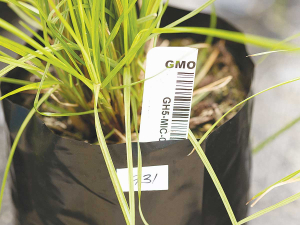Come and chat to the DairyNZ team
DairyNZ's team is looking forward to catching up with Southland and Otago dairy farmers at the Southern Field Days in Waimumu near Gore next month.
 The furore surrounding the proposal to end New Zealand’s near 30-year ban on gene technology outside the lab isn’t going away.
The furore surrounding the proposal to end New Zealand’s near 30-year ban on gene technology outside the lab isn’t going away.
OPINION: Submissions on the Government's contentious Gene Technology Bill have closed.
However, the furore surrounding the proposal to end New Zealand's near 30-year ban on gene technology outside the lab isn't going away. There's opposition from within the Government's traditional support base - farmers and growers.
Gene technology isn't all bad of course. It's seen as being able to deliver enormous benefits, including access to better cancer treatments, and increased productivity for farmers through such things as disease-resistant and drought-resistant grasses, and tools to help meet emissions targets. The bill is seen by many as a major milestone in modernising our laws to unlock the potential of science.
There's support for the intent of the bill from dairy and sheep and beef farmers. However, some farmers are worried about the trade and market access risk.
DairyNZ points out that there is a well-established system and practices used for production of high-grade seed crops, which provide a working example of co-existence in practice.
Beef+Lamb NZ says that there are potential opportunities to improve farmers' productivity and environmental impacts. However, it says there are also several potential risks that still need to be addressed in the proposed legislation. These include potential market or trade implications, traceability and co-existence, and how risks are classified.
State-owned AgResearch supports the bull and says it provides the opportunity to align NZ's activities and regulations with those of our major trading partners such as the US, Australia, China, and potentially the EU.
But there's opposition from organic farmers who claim the bill is a threat to organic and conventional farmers, makes GMO-free certification impossible and places financial risks on farmers, not biotech companies. They also claim that deregulation of GE products could remove mandatory labelling, leaving consumers unaware of what's in their food, and economic and trade risks for New Zealand's $1 billion organic industry.
The Government remains committed. Gene technology is a powerful tool that has the potential to deliver enormous benefits for New Zealand, it says. They may have the numbers to pass the bill, but should not ignore the views of those who don't want it enacted.
Coming in at a year-end total at 3088 units, a rise of around 10% over the 2806 total for 2024, the signs are that the New Zealand farm machinery industry is turning the corner after a difficult couple of years.
New Zealand's animal health industry has a new tool addressing a long-standing sustainability issue.
The Government has announced that ACC will be a sponsor of this year's FMG Young Farmer of the Year competition.
As veterinary student numbers grow to help address New Zealand's national workforce shortge, Massey University's School of Veterinary Science is inviting more veterinary practices to partner in training the next generation of vets.
South Island dairy farmers will soon be able to supply organic milk to Fonterra.
Norwood has announced the opening of a new Tasman dealership at Richmond near Nelson next month.

OPINION: Meanwhile, red blooded Northland politician Matua Shane Jones has provided one of the most telling quotes of the year…
OPINION: This old mutt has been around for a few years now and it seems these ‘once in 100-year’ weather…